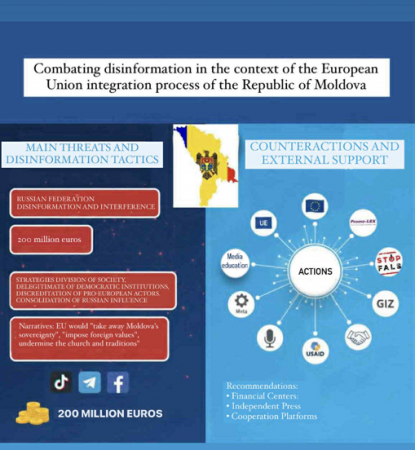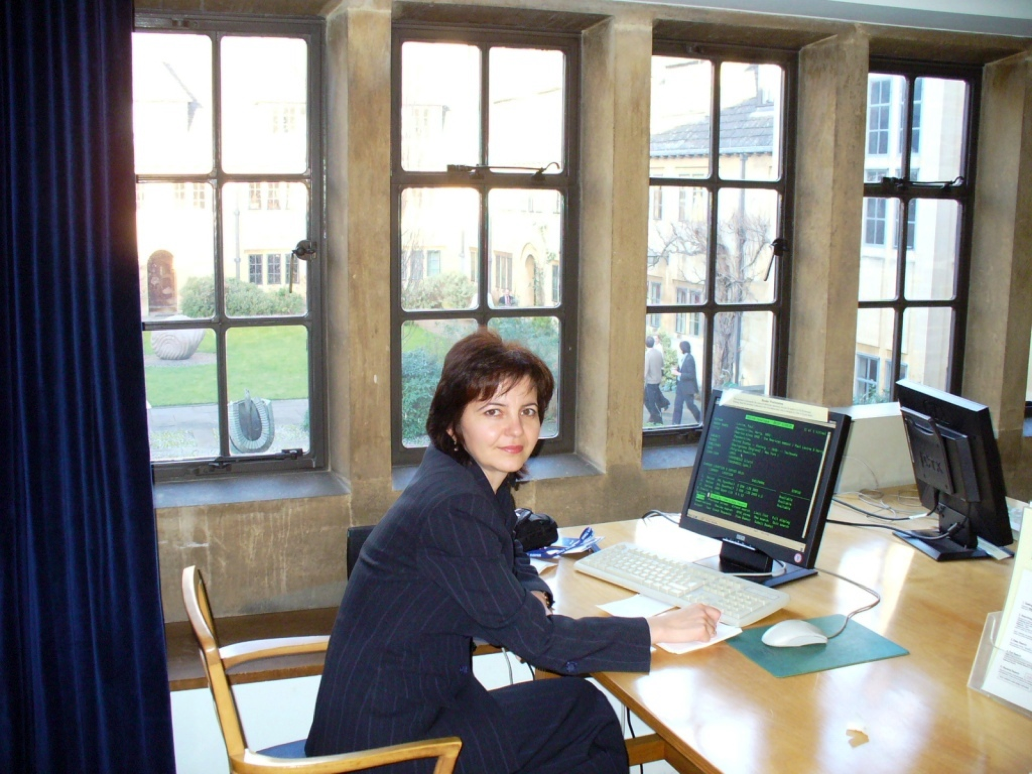The Republic of Moldova faces unprecedented disinformation threats as it pursues European Union membership. The country obtained EU candidate status in June 2022 and opened accession negotiations in December 2023. Since then, Moldova has been targeted by systematic Russian-backed information campaigns as part of the sustained hybrid influence aimed at eroding public confidence in state institutions, polarizing Moldovan society, and obstructing the country’s pro-European path. This brief outlines the nature of these threats and provides actionable policy recommendations to strengthen Moldova’s information resilience.
Context & background
The Republic of Moldova submitted its application for EU membership on March 3, 2022, in a geopolitical context marked by Russia’s invasion of Ukraine and renewed concerns about regional security. On June 23, 2022 Moldova obtained candidate country status, marking a significant milestone in its European journey. Accession negotiations were formally opened in December 2023 and started in June 2024, demonstrating the accelerated pace of Moldova’s integration process.
A constitutional referendum was held in October 2024, which confirmed that Moldova’s population supports European integration, despite the Russian Federation’s effort to interfere with the referendum with disinformation campaigns. Subsequently, the Kremlin tried to influence the parliamentary elections held on September 28, 2025, working to prevent Moldova from continuing its pro-European path. The election results reconfirmed the pro-European orientation of the population. However, media disinformation campaigns and protests funded by opposition and conservative groups continue to threaten political stability and the strategic objective of EU accession.
The threat landscape
Between 2023 and 2025, according to authorities in Chisinau, Moscow, and its local allies carried out a large-scale information manipulation campaign. Official sources estimate that Russian agents spent approximately 200 million euros to influence the results of the presidential election and the 2024 referendum on European integration. This massive investment reflects the strategic importance Russia places on preventing Moldova’s Euro-Atlantic integration and maintaining its influence in what it considers its sphere of interest.
The disinformation ecosystem operated across multiple digital platforms, particularly on TikTok, Telegram, Facebook, and YouTube. These platforms have become the primary platforms for disseminating false narratives, coordinating inauthentic behavior, and manipulating public opinion. In early 2025, the Russian Federation intensified two major operations targeting Moldova: “Matryoshka” and “Overload.”

Operation “Matryoshka,” launched in 2023, represents a sophisticated approach to information warfare. This campaign disseminates fake pro-Russian content while claiming it originates from respected Western media outlets, thereby exploiting the credibility of legitimate journalism to spread disinformation. According to data provided by NewsGuard, between April and July 2025 alone, “Matryoshka” disseminated 39 fake news stories about the Republic of Moldova, generating approximately two million views on Telegram through accounts that imitated 23 international media outlets. This impersonation strategy is particularly insidious because it undermines public trust not only in accurate information but in the very concept of reliable journalism.
Operation “Overload” employs a different but equally destructive tactic: overwhelming fact-checkers with massive volumes of falsified material. Analyses by the Institute for Strategic Dialogue and CheckFirst indicate that “Overload” targeted Moldova more aggressively than any other state in the second quarter of 2025. The campaign promoted narratives of government corruption, anti-Ukrainian messages, and accusations of political destabilization ahead of the elections. By flooding the information space with false claims faster than they can be debunked, this operation aims to create an environment where citizens lose the ability to distinguish truth from falsehood.
Several journalistic investigations conducted by BBC News Russian, Ziarul de Garda, and NordNews.md have exposed the tactics of this propaganda offensive. According to these investigations, hundreds of trolls were recruited through Telegram and paid in cryptocurrencies by networks associated with fugitive Russian oligarch Ilan Shor, who has been sanctioned by both the US and EU. These paid operatives disseminated false information aimed specifically at discrediting President Maia Sandu and her pro-European party.
The European Parliament has identified these interference and manipulation campaigns on social networks as representing one of the most serious threats to Moldova’s European path. The campaign included using artificial intelligence (AI) generated content and distributing falsified documents. During the 2025 presidential election period, Meta removed a network of fake accounts targeting Russian speakers in Moldova for violating its policy on coordinated inauthentic behavior. The operation included seven Facebook accounts, 23 pages, one group, and 20 Instagram accounts that promoted criticism of President Maia Sandu and pro-European parties while amplifying messages favorable to pro-Russian parties.
Objectives of disinformation
 The European Commission’s 2023 and 2024 reports and the European Parliament reports on Moldova have warned of ongoing hybrid attacks and disinformation campaigns by Russia aimed at disrupting Moldova’s pro-European path.
The European Commission’s 2023 and 2024 reports and the European Parliament reports on Moldova have warned of ongoing hybrid attacks and disinformation campaigns by Russia aimed at disrupting Moldova’s pro-European path.
According to the European Parliament reports, these disinformation campaigns pursue four main strategic objectives. First, they aim to divide society by exploiting existing social cleavages and creating new lines of polarization based on language, ethnicity, regional identity, and economic grievances. Second, they seek to delegitimize democratic institutions by eroding public trust in government, parliament, the judiciary, and electoral processes through constant accusations of corruption and incompetence. Third, they work to discredit pro-European actors by undermining political leaders and parties supporting integration through character assassination, fabricated scandals, and attempts to associate them with unpopular policies. Finally, they strive to consolidate Russian influence by maintaining a constant presence in Moldovan public discourse and portraying Russia as a defender of traditional values and national sovereignty against Western interference.
Toxic narratives
The efforts to undermine public support for European integration by spreading narratives portraying the EU as a threat to Moldova’s sovereignty, peace, and traditional values intensified especially during Moldova’s 2025 parliamentary elections.
A key theme of this disinformation campaign was exaggerating the threat of war. The opposition and Kremlin-linked media promoted the false claim that the EU was “dragging Moldova into war with Russia,” exploiting public anxiety about regional security. Georgia was frequently invoked as a cautionary tale, with opposition media suggesting that the Georgian government’s pro-European policies brought the country closer to conflict. These narratives reframed Moldova’s pro-Western leadership as “warmongers,” allegedly planning provocations in Transnistria and risking national security for EU approval.
The disinformation campaign escalated further through conspiracy theories disseminated by pro-Kremlin propagandists such as Diana Panchenko. In her widely circulated “open letter to U.S. President Donald Trump,” Panchenko falsely accused Moldovan President Maia Sandu and European leaders of plotting a NATO-backed military operation to “occupy” Moldova and provoke war with Russia. Russian state-linked Telegram channels and the Foreign Intelligence Service (SVR) later amplified this fabrication, claiming that NATO countries were preparing to invade Moldova after the elections.
Simultaneously, Russian media sought to discredit Moldova’s cooperation with NATO by promoting the myth of an “aggressive NATO bloc” expanding into Moldova despite its declared neutrality. In a notable shift, the EU itself increasingly replaced the United States as the primary antagonist in Kremlin-aligned propaganda, illustrating Moscow’s broader strategic goal: to erode Moldovan trust in European institutions and stall the country’s EU accession process.
Overall, these narratives served Moscow’s strategic objective of weakening Moldova’s pro-European consensus, fostering political polarization, and legitimizing the Patriotic Bloc’s calls to “freeze” EU integration under the guise of defending neutrality, tradition, and peace.
Governmental and civil society responses
To counter these risks, the authorities in the Republic of Moldova created the Center for Strategic Communication and Countering Disinformation, aimed at strengthening inter-institutional efforts to combat information manipulation. This center coordinates actions to prevent and respond to disinformation campaigns that may affect national security and the country’s path to European integration. The European Commission launched funding mechanisms to strengthen fact-checking networks, including a five-million-euro call for candidates and neighboring countries vulnerable to pro-Kremlin narratives. The German Agency for International Cooperation has also launched a project in 2023 dedicated to identifying and monitoring false information in Moldova.
Civil society and independent media have played a crucial role in combating disinformation. In the 2025 pre-election campaign, Expert Forum monitored 100 inauthentic accounts that accumulated 13.9 million views, while Promo-LEX identified 500 fake accounts that generated 1.3 million views in just three days, highlighting the enormous scale of the campaign. The Stopfals.md portal, a project of the Independent Press Association, contributed to reducing the effects of false information and developing critical thinking among the public through systematic fact-checking and public education.
Media education projects organized by the Independent Journalism Center and IDIS Viitorul promoted media literacy and trained journalists to identify information manipulation. The European Union supported the “Supporting Independent Press and Information Resilience” project to develop a free and resilient press. Additionally, over 100 journalists and communication students participated in workshops organized by the Institute for War and Peace Reporting, dedicated to ethical reporting in the era of fake news.
Policy recommendations
To continue and strengthen efforts to combat disinformation, the following actions are recommended:
Institutional capacity must be reinforced by ensuring the effective financing and functioning of the Center for Strategic Communication and Countering Disinformation. This requires allocating adequate budget and personnel, establishing clear operational protocols, and enabling rapid-response capabilities to address emerging threats in real-time.
Media literacy programs should be expanded at the national level and integrated into educational curricula at all levels. Public awareness campaigns must be developed to reach diverse audiences, and accessible resources should be created to help citizens critically analyze information they encounter daily.
Partnerships with local media must be strengthened to reduce the amplification of false messages. This includes supporting independent journalism financially and technically, facilitating information-sharing networks among media outlets, and building collaborative fact-checking mechanisms that can respond quickly to emerging narratives.
Moldovan legislation should be aligned with European standards on combating disinformation. Legal frameworks must be harmonized with the EU Digital Services Act while ensuring that regulations protect free speech while addressing harmful content. Transparency requirements for political advertising should be implemented to expose foreign interference.
Independent media must be supported and financial transparency ensured throughout the media ecosystem. This requires diversifying funding sources for independent outlets, requiring disclosure of media ownership and financing, and protecting journalists from legal and economic pressure that could compromise their editorial independence.
Public-private cooperation with digital platforms must be enhanced to eliminate fake networks more effectively. Formal mechanisms should be established for identifying coordinated inauthentic behavior, rapid takedown procedures developed, and platform accountability promoted through regulatory frameworks and voluntary commitments.
Pro-European messages based on concrete benefits adapted to local audiences should be actively promoted. This involves developing positive narratives about EU integration that highlight tangible benefits for citizens, addressing concerns with evidence-based communication, and tailoring messaging to different demographic groups to ensure resonance across Moldovan society.






